#american fiction review
Text
Movie Review: American Fiction 2023. Sarcastic wit. Hilarious punchline. Must Watch!
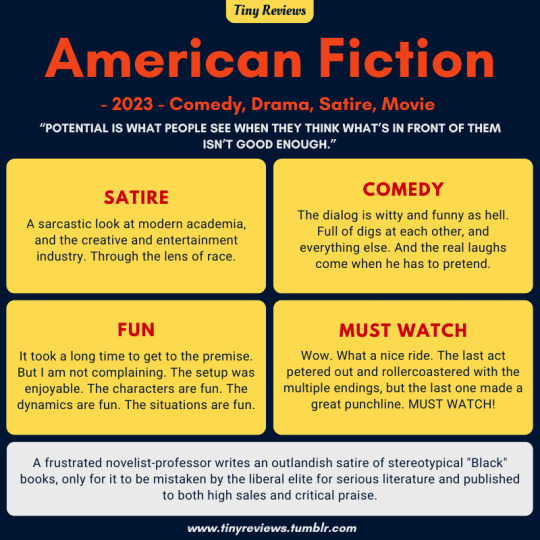
I gave this movie a pass at first. But the hype from the Oscars made me watch it and I enjoyed this movie a lot! For a comedy, it dealt with quite a lot of serious topics. The last act is kinda messy but the punchline hit right.
It’s a clever story. The structure is clever. The characters are clever. The dialog is clever. The ending is hilarious. MUST WATCH!
Did you find the movie (and dialog) clever? I like the sister, Lisa, a lot!

American Fiction is a 2023 American comedy-drama film written and directed by Cord Jefferson, in his feature directorial debut. Based on the 2001 novel Erasure by Percival Everett, it stars Jeffrey Wright, Tracee Ellis Ross, Issa Rae, Sterling K. Brown, John Ortiz, Erika Alexander, Leslie Uggams, Adam Brody, and Keith David.
#oscars#american fiction#american fiction review#movie review#jeffery wright#tracee ellis ross#issa rae#sterling k. brown#john ortiz#erika alexander#leslie uggams#adam brody#keith david#erasure#percival everett#2023#must watch#2024 oscars#oscars 2024#black movies
10 notes
·
View notes
Text
instagram
revolttv
Shoutout to @cordjefferson not just for his phenomenal Oscar-winning film #AmericanFiction, but for making plain what we’ve always known — our stories are not a monolith and ALL depictions of Black life and Black experiences should be told and embraced.
Looking at you @theacademy, and Hollywood gatekeepers…👀👀👀
#REVOLTRevolutionaries ✊🏾
#Oscars#oscars 2024#the oscars#academy awards#winners#american fiction#erika alexander#jeffrey wright#american fiction movie#american fiction 2023#american fiction review#Instagram
3 notes
·
View notes
Text
So, About American Fiction,
There is a reason this film was nominated for five Oscars. It is a well-made, charming, funny, and thought-provoking critique of how the American entertainment industry views representation and people of color. Otherwise there really isn't too much else I can say. Take the time to sit down with this one, you won't regret it.
0 notes
Text
My ★★ review of American Fiction (2023) on Letterboxd:
0 notes
Text
Film review: “American Fiction” (2023)

View On WordPress
#ADAM BRODY#American Fiction#American Fiction review#Erika Alexander#film#Film review#Issa Rae#Jeffrey Wright#John Ortiz#Leslie Uggams#movie#movie review#Review#Reviews#Sterling K. Brown#Tracee Ellis Ross
0 notes
Photo
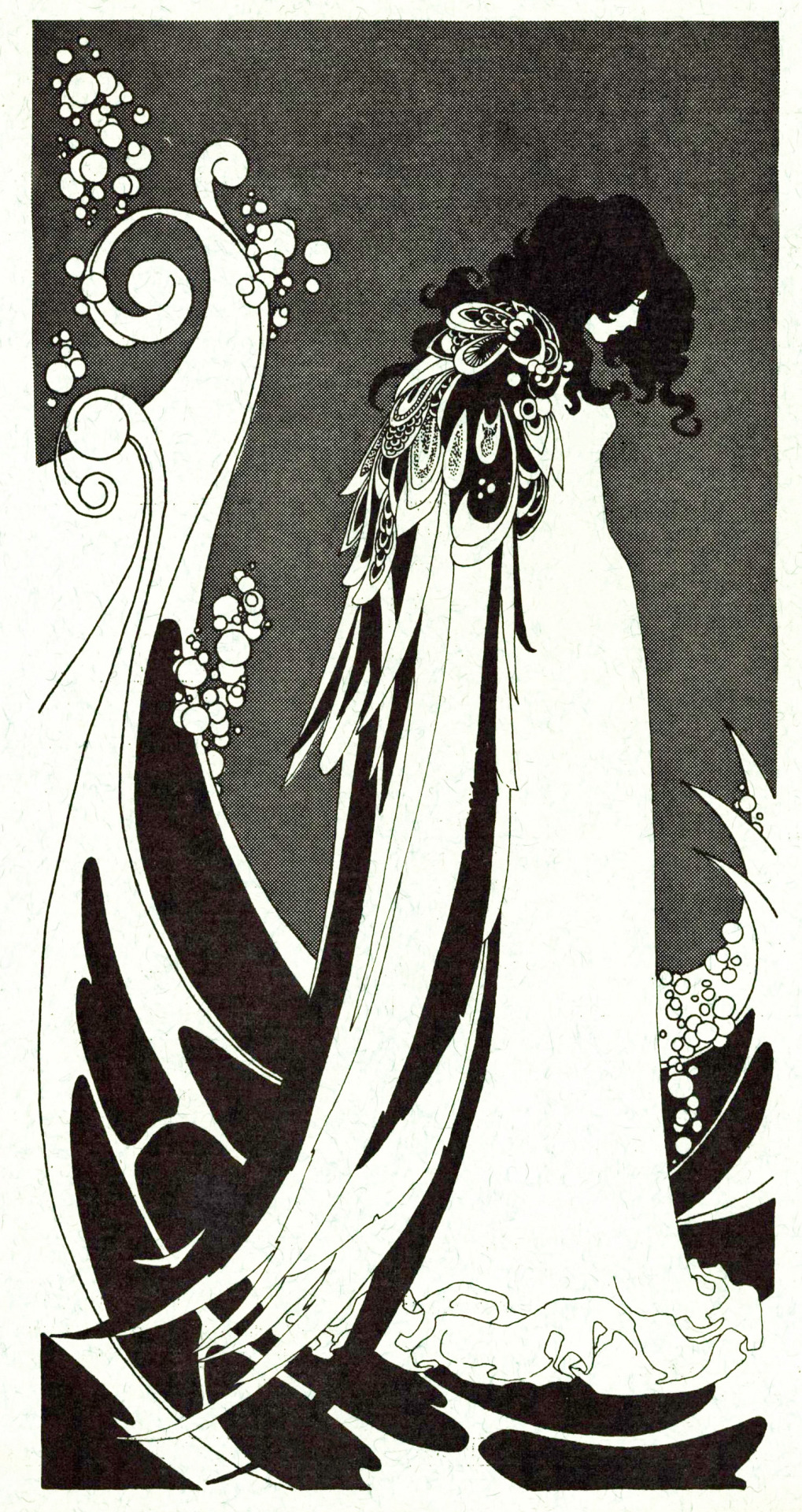
Alicia Austin, ''Science Fiction Review'', #39, Aug. 1970
Source
#alicia austin#american artists#science fiction review#magazine covers#cover art#fanzines#science fiction fanzines
7K notes
·
View notes
Text
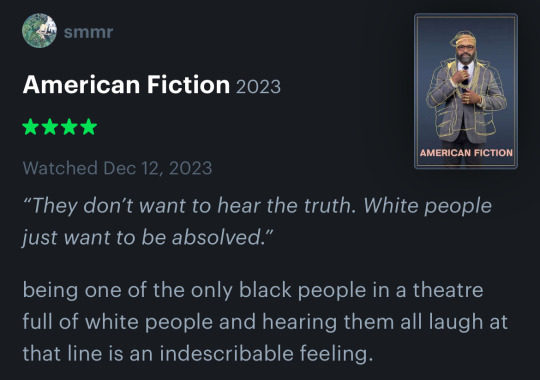
#letterboxd#movie#movie review#movie reviews#movies#movie recommendation#movie recommendations#review#reviews#american fiction#jeffery wright#blm#black lives matter
780 notes
·
View notes
Text
Sheine Lende by Darcie Little Badger

Source: NetGalley ARC
Publisher: Levine Querido
Release date: 16 April 2024
Genre: young adult historical/urban fantasy (70s rural Texas)
If you like:
dogs (ghost dogs!)
various ghost animals, existing and extinct
no romance whatsoever
hope and community in the midst of grief and loss
Rating: ⭐️⭐️⭐️⭐️⭐️/5
Synopsis
Shane works with her mother and their ghost dogs, tracking down missing persons even when their families can't afford to pay. Their own family was displaced from their traditional home years ago following a devastating flood - and the loss of Shane's father and her grandparents. They don't think they'll ever get their home back.
Then Shane's mother and a local boy go missing, after a strange interaction with a fairy ring. Shane, her brother, her friends, and her lone, surviving grandparent - who isn't to be trusted - set off on the road to find them. But they may not be anywhere in this world - or this place in time.
Nevertheless, Shane is going to find them.
Content warnings
Colonisation
Loss of close family members
Illness
Natural disasters
Grief
Review
I found out about this book while scrolling through NetGalley, and the second I saw that it was a prequel to Elatsoe, I had to read it.
This is a prequel about Elatsoe's grandmother Shane as a 17 year old girl, but you don't have to read Elatsoe to know what's going on, and both books can be read in either order as standalones.
This book is so well-crafted and thoughtful; it took me a little while to fully immerse myself in the story, because the setting and vibe is so different from Elatsoe, and it is a little slower paced, but once I got into the groove, the story flowed over me.
We follow Shane as she tries to figure out the mystery of her mother's and a child's disappearance, and along the way we learn about her history, as well as explore her relationships with her family and friends.
A strong focus of the book is on Shane's grief; grief from losing not only her home and her family members, but also losing her culture and language. This book tackles the harms caused by colonialism, which goes beyond stealing land, but also erases culture and peoples.
At its heart, this book is about family and community. At times Shane may feel alone, like she has to take on her burdens by herself, but her friends and family are always there for her (dead or alive).
I also loved Rovina Cai's lovely illustrations at each chapter heading; they tell a story parallel to the main story, and they add another layer of depth.
Overall, this is book was written full of heart, and it shows <3
#sheine lende#darcie little badger#booklr#book review#rovina cai#readblr#elatsoe#native american#indiginous authors#urban fantasy#own voices#young adult#ya books#ya fantasy#ya fiction
13 notes
·
View notes
Note
I've never read anything quite like Fever Dream. I couldn't understand a lot of it as I read, although I do understand the characters and plot overall. In each moment, did you understand what was happening? What did you find profound? What did you like best artistically about it, and were there any big philosophical statements?
What a cool, exciting ask! I love this book, I wrote a 6-page essay about it for college at the time and I was never able to read it again because of how strong the experience was for me (I want to preserve the memory).
Latin America's magical realism is not about introducing some fantasy features into the ordinary, is more about the mystical experience of reality itself, the haunting mysteries or inexplicable events of life. They exaggerate the surreal, "magical" aspect to highlight the main issue. I will share more about that in the end.
What I like about Fever Dream the most is its originality. Once you start the book, you have to feel lost. That's the whole point. Schweblin is so bold, she actually doesn't want you to "understand what is going on", she invites you into the MC's feverish dream, and for that to happen you literally have to let go of any expectations and let the story unfold at its own pace. I honestly will recommend this book to any writer who is willing to take the (eco)horror path.
But it's not just about that. Personally, this book got to me because of the "rescue distance" concept — a better translation of the original title. As someone who lost a baby, the whole paranoia that comes from sensing danger, but being blind to it at the same time, drove me almost mad. I ate that book in one afternoon — and I'm a slow reader. Couldn't stop turning pages. It was too similar to my personal experience of foreseeing death, knowing that something was just about to happen, and not being able to avoid it at all. Very cathartic, per se.
But to talk more directly about the book, I will use my own words from a few years back, and if you don't want spoilers, don't read it:
"In the end, the loose thread remains. The feeling of loss is inevitable. All the danger and sense of paranoia culminated in a whirlwind of unstoppable events, engulfing the reader in a tachycardic, spiralling route; and he lands with the certainty that something very important was left behind: the essential and irreplaceable — perhaps, life itself. It's like returning from a trip without your luggage, empty-handed. Maybe this loose thread is the sensation of the entire humanity when confronted with its impotence in the face of a scenario of constant catastrophe, of destruction that disintegrates everything around: the web being woven as one lives, without being able to deviate from the tracks or turn back. The inevitability of evil — are we like Amanda, doing our best to protect those we love, and always losing what matters most? What similarity would we have with David, tying everything in his room (p.136), trying to connect the loose thread of this unreachable distance that can no longer be calculated? He may be trying to connect with what little remains, that which seems solid, in search of connecting then with something familiar; something that sustains a world that seems to be in free fall, heading nowhere. And this world — this same world of mutations, poisoned mist, dead ducks buried in the backyard, of silence that devoured all things, this world of Schweblin's magical realism — this is our own world."
I might upload my reviews and essays one day if I ever have enough energy and time to open a substack or something (they are too long). Latin American literature is fire! I'm glad you have this book a chance :) and thanks again for the ask!
#writers on tumblr#book review#reading#favorite books#bookblr#booklr#books and literature#literature#contemporary literature#latin american literature#fever dream#book recommendations#ivatalks#magical realism#fantastic realism#horror#eco horror#fiction#novel#contemporary books
10 notes
·
View notes
Text
For the record, I did finally see "American Fiction" a few nights ago. I am recommending you watch this movie, so I don't want to spoil it too much, but I wanted to share my thoughts.
When a slice-of-life movie is done well, I can really enjoy it, but if that aspect fails, a movie can become very cloying and tedious. In this case however, it was done well. "American Fiction" is a very cozy, very digestible movie that just follows this one family through the highs and lows of their summer. There are multiple subplots which have little to do with eachother, let alone the main story, but that's okay; it feels more realistic that way and the subplots are quite charming in their own right. The dialogue expresses familiar sentiments from other movies, but in a way that still feels fresh. In a sense, the trailer almost feels like a prank on the audience; white moviegoers were promised a mean-spirited satire on race relations, and instead what we got was 90 minutes of black people existing comfortably with minimal conflict. But if you're disappointed, that's on you. Setting aside the politics altogether, it's just refreshing to - every once in a while - watch a quieter movie about normal people being kind to eachother. Nobody has to die in order for a drama to be good... well... almost nobody.
The A-Story is basically just a rip-off of Spike Lee's "Bamboozled". Like I said, the story we saw in the trailer really only made up less than a third of the plot. And if you're upset about the bait-and-switch, "American Fiction" succeeded at what it was trying to do, but... also if you really wanted a movie about a writer pushing the envelope of prejudice for personal gain, you can still just go and watch "Bamboozled". For that matter, "Bamboozled" was already vaguely the same plot as Mel Brooks' "The Producers". I guess my main question is what it says about the psyche of white people, when you compare "American Fiction" to a movie made 24 years prior which had basically the same premise. Does it represent improvement, that a film can make the same social commentary without resorting to the same extremes to get the point across? Or have we grown more sensitive; is "American Fiction" a more toned-down version of the story simply because you could never make "Bamboozled" in the PC world of today? I hope it's the former. You probably couldn't remake "Bamboozled" today, but more importantly, "American Fiction" couldn't have been made in the 90's; the imagery of Monk's book was so commonplace back then, I don't think it would have occurred to white audiences that anything was even amiss. On the other hand, I think the white people in "American Fiction" are somehow more cartoonish; I remember a few moments while watching "Bamboozled" where I went, "Oh shit! Ok, I have said/done/thought stuff like that IRL", and I never had that moment watching "American Fiction". I call the movie "digestible" and "cozy" because I was able to get through the whole thing and not once did it feel like the movie was attacking me. But again, even if your movie sets out to make white people uncomfortable, that's still centering the story too much around our emotions; "American Fiction" had the more important goal of simply telling a story where black people are allowed to be happy.
The cringe comedy is extremely funny. This is the main reason I'm recommending the movie as lighthearted fun. Half the jokes boil down to "Jeffery Wright is annoyed" (and IMO that itself is enough to sustain a film), but there were also some lines of dialogue which completely caught me off guard. The movie is still more CUTE than it is FUNNY, but for a "cute" movie I was laughing almost all the way through. The other film I'd compare "American Fiction" to is "Dan in Real Life", and I definitely prefer this one, both in terms of likeable characters and quality of dialogue.
Spoilers ahead! I liked how the story had three endings, and like "Clue", the audience is left to pick which one they want. I still won't be spoiling what happens but I did want to talk about this part: It's fine that Ending A was never explained in detail; Monk has made his feelings about the situation pretty clear at this point; anyone with two braincells to rub together can use their imaginations and guess what he would have said at that podium. Ending B is pretty obviously the correct answer. Not only does a "rom-com" ending fit with the tone of the rest of the movie, but I think it gives the best resolution to what the story was actually about. I said none of the racist characters made me embarrassed about my own behavior, but that doesn't mean I didn't see Monk's personality flaws as a reflection of myself. "Tortured artist realizes at the 11th hour that his judgmental attitude has been isolating him from the people he cares about" is a theme I very much relate to, and it's the kind of story I've been wanting to write for years. Ending C was a little bit predictable, but still worked as the climactic punchline. It was the moment the story went from feeling like an unintentional ripoff of "Bamboozled" to a more direct parody of it. Ending D causes the rest of the story to become confusing, but it at least retroactively excuses some of the more contrived/cliched moments which happened at the beginning of the film.
So yeah. In conclusion, good movie, little forgettable but pretty damn funny. Go see it. Jeffery Wright is a DILF and I could watch another 90 minutes of him meandering around the beach, staring soulfully out at the ocean.
12 notes
·
View notes
Text
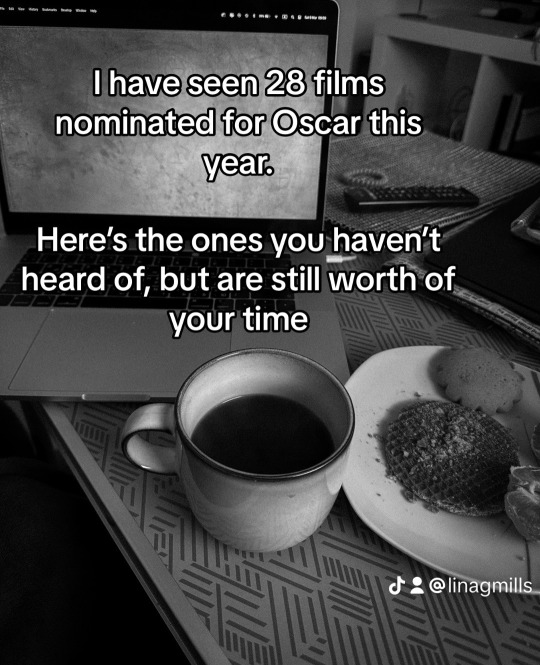
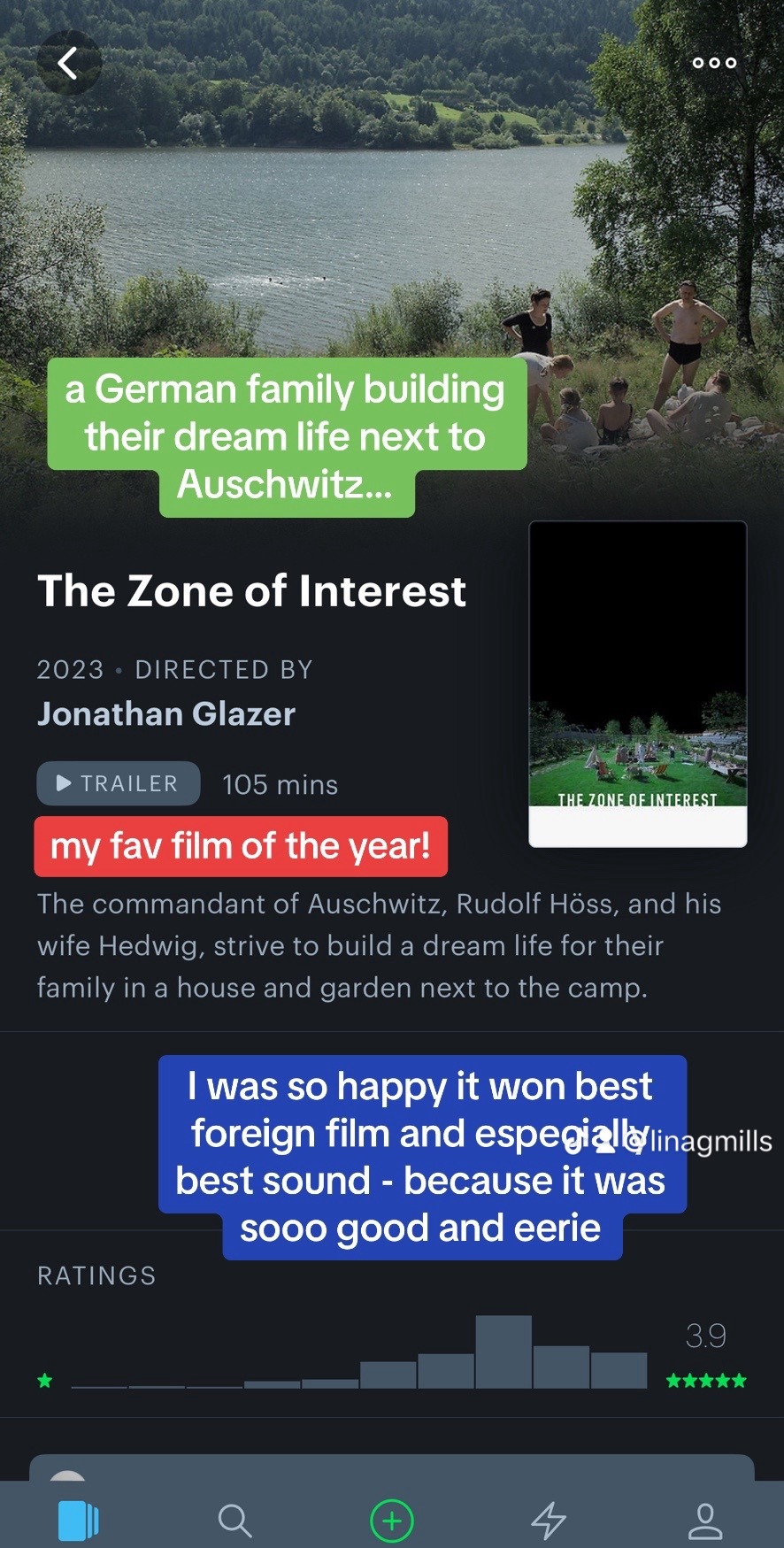


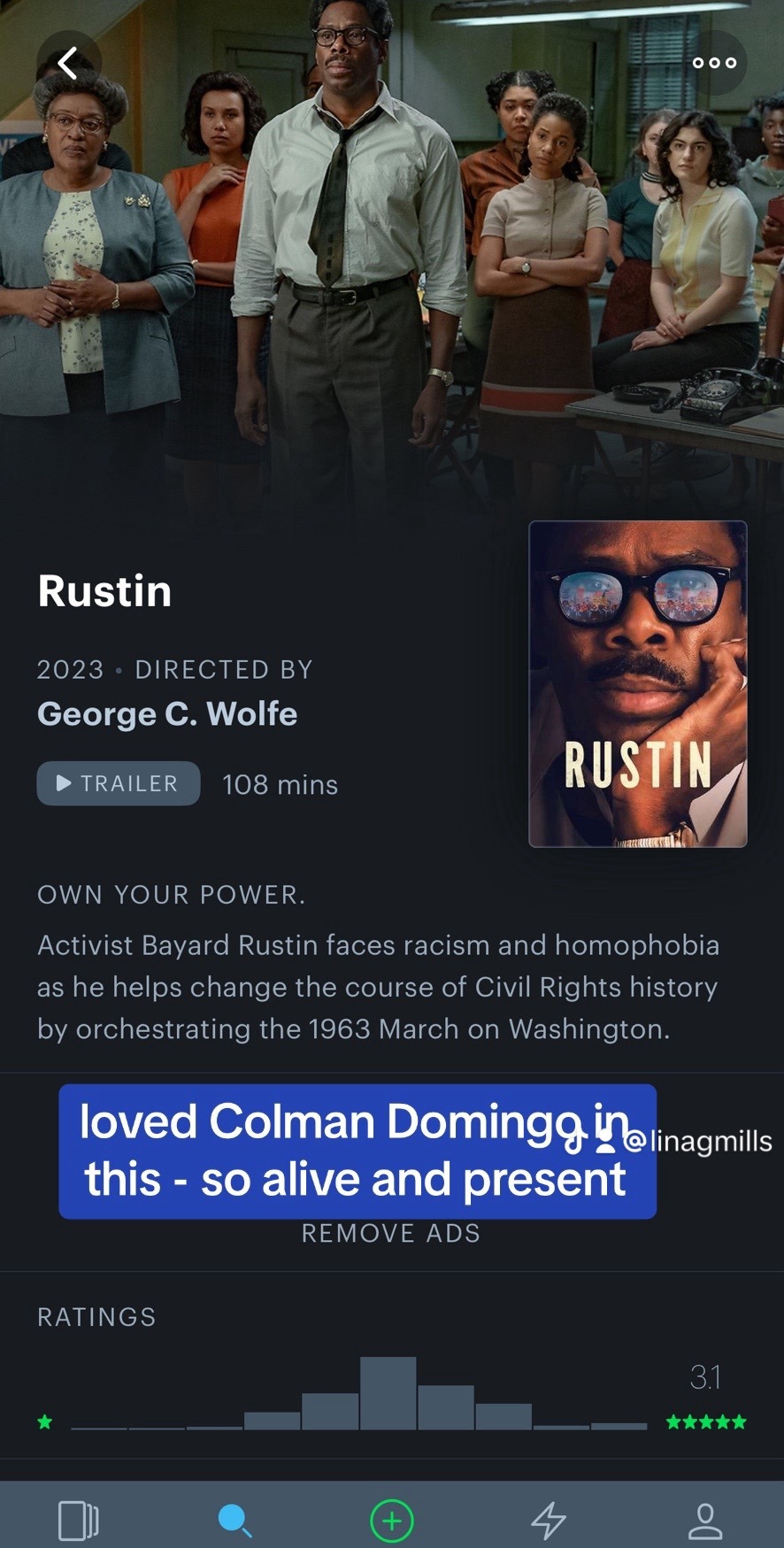
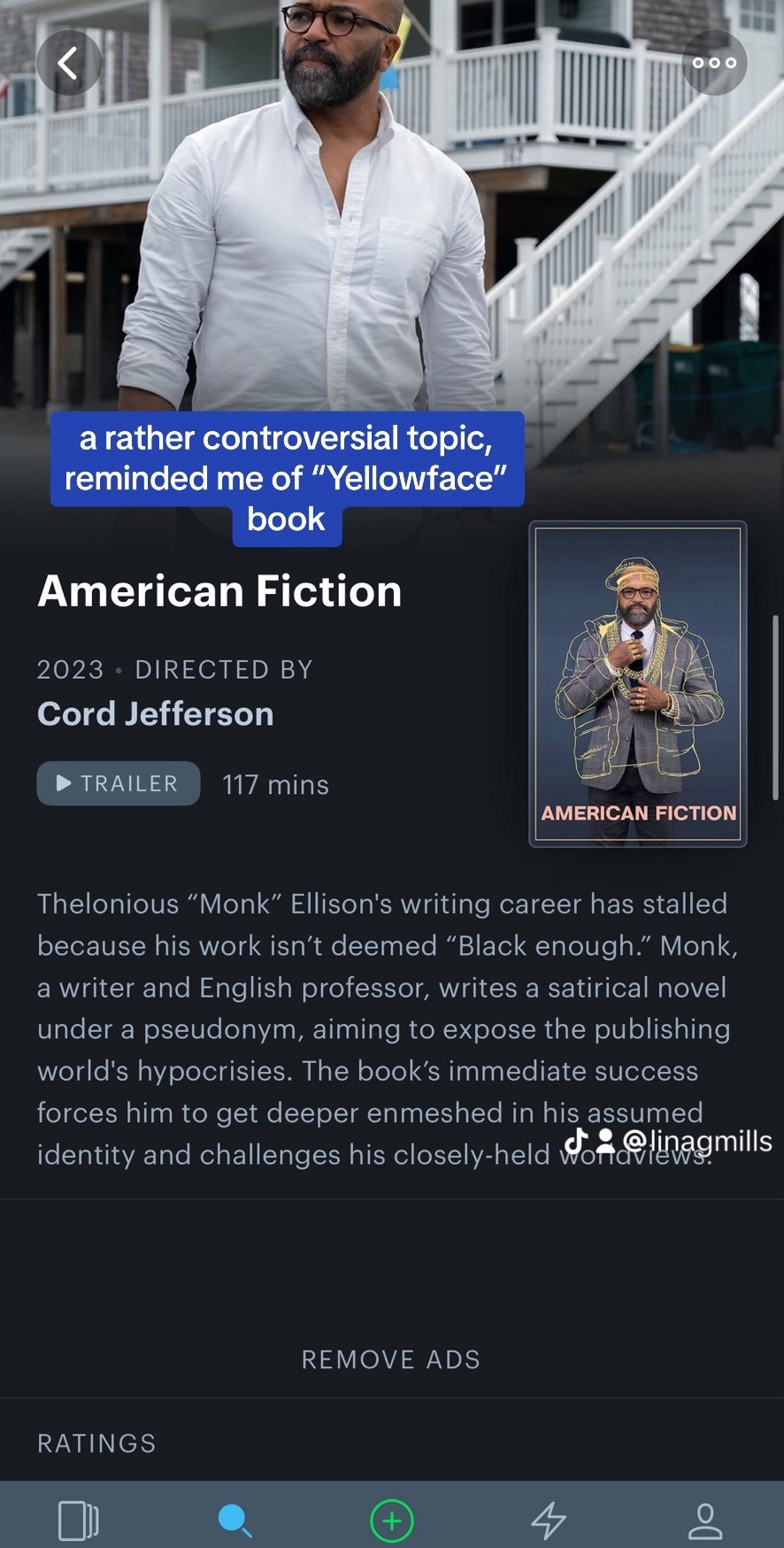

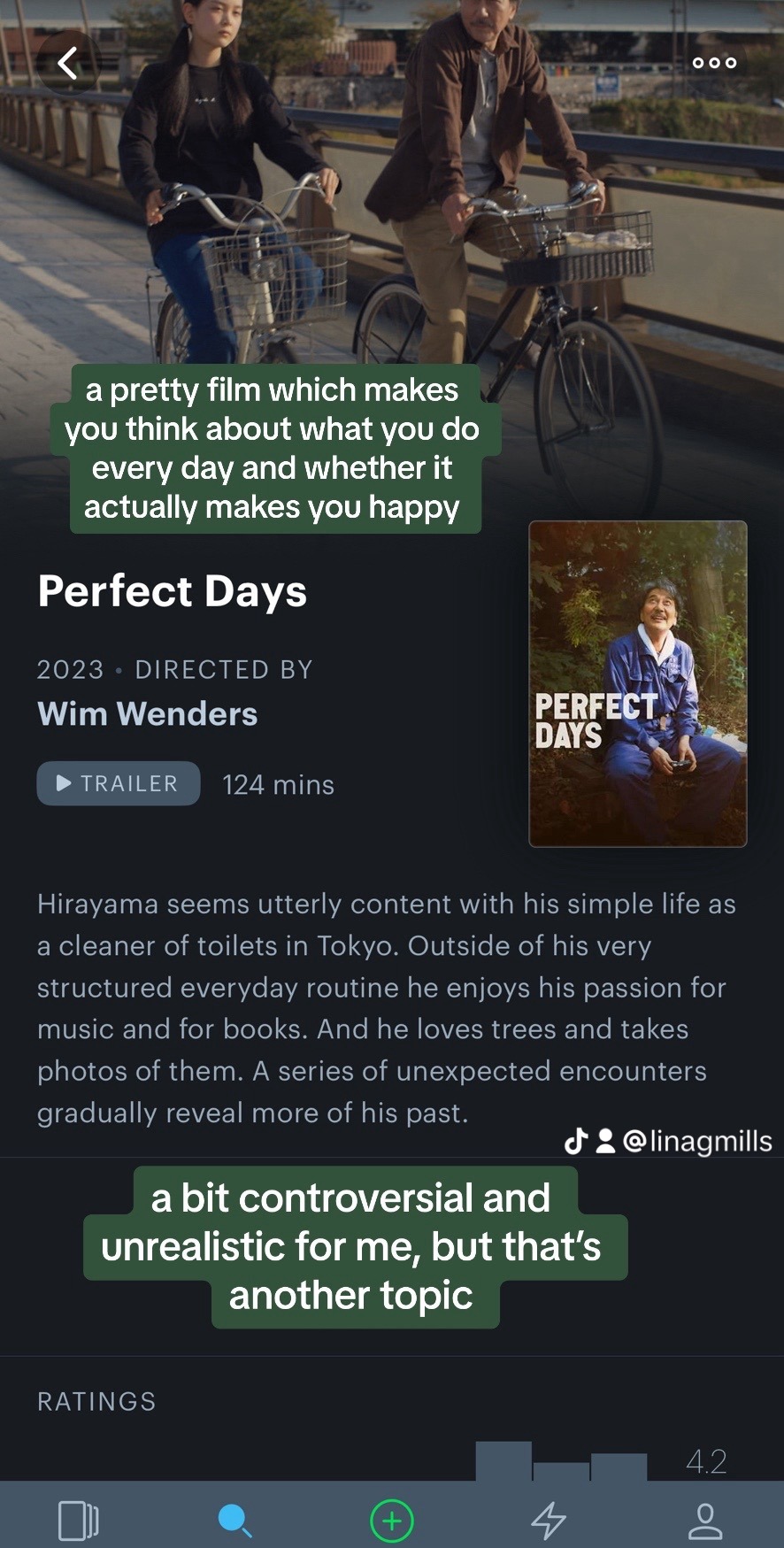


Oscar 2024 films you haven't heard about
#the teachers lounge#io capitano#american fiction#rustin#films#anatomy of a fall#perfect days#el conde#robot dreams#film review#what to watch#films to see#oscars 2024#oscars#best films#best films of the year#indie films#indiefilms#unpopularfilms#bestfilmsof2024#foreignfilms
8 notes
·
View notes
Photo
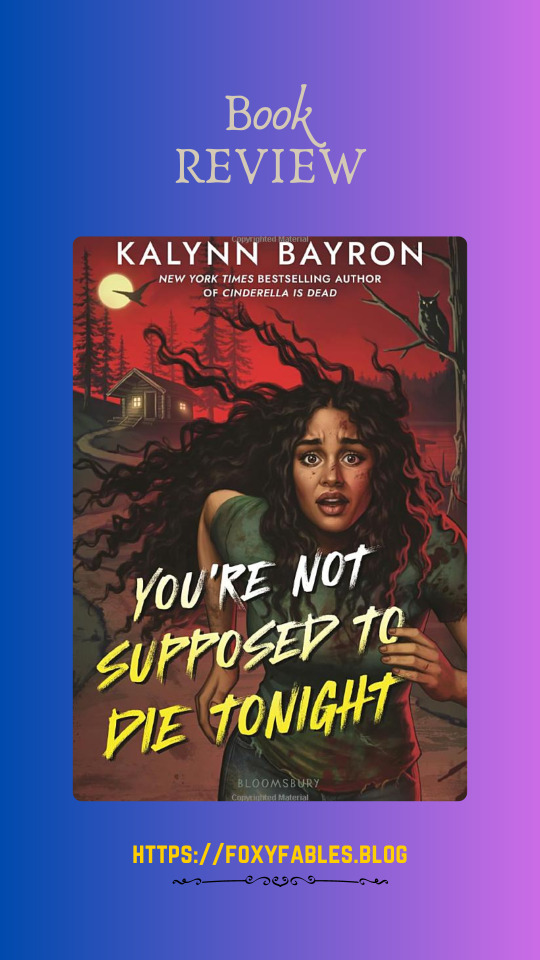
Check out my Book Review: You're Not Supposed To Die Tonight
#young adult horror#book review#Kaylynn bayron#you're not supposed to die tonight#young adult fiction#book blog#bookish#young adult novel#LGBTQ fiction#sapphic fiction#young adult thriller#young adult mystery#booklr#african american fiction#teen horror
31 notes
·
View notes
Text


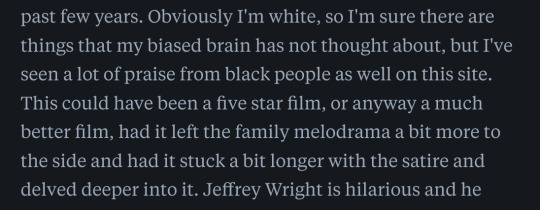
So many reviews complaining about the fact that it has "family drama" in it like. Mate.
7 notes
·
View notes
Text

My first read of 2024! (well the first book I’ve finished, anyway.)
Rating: ⭐️⭐️⭐️ + 1/2
Thoughts:
Mixed bag. Structure wise, this book was a very interesting read. I read this book for one of my classes, and we briefly touched upon how Faulkner's writing in this work seems to be much more geared towards showing off his literary skills. And in my opinion, I think this was the driving force of the novel rather than the message. To me, as a book worm, nerd, and student of literature, of course literary skill is impressive and important in great literary works, but I find that the most impactful books are ones that you put down and are truly moved by the story or the language. This book I was simply quite confused.
I'll explain why I feel this way for a few reasons: first the structure. The book being split into different parts with different narration (and different narrative styles) was, stylistically, very intriguing and impressive. Readers encountered Benjy's unique lens of the world, which didn't provide us much context or structure. This could either completely repel readers, or intrigue them further by the mystery Faulkner sets up. We are then introduced to Quentin's section, which I'll get into detail for in a second. The narration here is slightly less confusing, but because of his unique character, it is still quite broken and confusing. In Jason's section, the narration is much more clear and we're provided more context for the Compson's family relations, such as Caddy's daughter, Quentin, living with Jason and their mother. On pages 212 to 214, we're also given insight on the terrible way Jason treats his sister, as well as her crumbling life: begging for contact with her daughter, and begging for some money. Finally in the last section, readers are provided with a third-person omniscient narrator (and the writing in this section was GORGEOUS). Because there were four distinct types of narration, it seems to me Faulker was more focused on style than the message. Of course there was an important message, but because the style was so insanely confusing at times, I'm not sure how much of the message readers truly receive by the end of the book. Which is the beauty of literature: some books are so incredibly written it takes three or four reads to truly understand the point. But for me, since two sections of this book had incredibly difficult narrative styles, I'm not even sure how much I grasped of the plot or the family dynamic, never mind the meaning behind these relations. It was almost so stylistically impressive that it's just too frustrating to understand.
Though I would like to add: the different narration styles had a point: Faulkner was trying to express the same idea or feeling in each section, with four different methods of writing. In interviews, he shared that he saw this book as a failure; saying he was never truly able to get his message across, no matter which narrative style he chose. That is the beauty of this novel: Faulkner deliberately demonstrates the limits of language. My favorite example of this is the church sermon at the end of the novel, from pages 292-296. On page 292, Faulkner describes the church to look like a painting: “the whole scene was as flat and without perspective as a painted cardboard set upon the ultimate edge of the flat earth…” These descriptions of the scene as painted signify how Faulkner’s words on the page are flat and two dimensional. During the sermon, the preacher barely says anything, but the church goers have a transcendental experience just being in the room: experience allows one to transcend language itself. The only way to truly grasp human truths is to transcend language itself; it limits us, whereas experience frees us. The preacher seems to communicate to the crowd through empathy and emotion rather than words. It is the spaces in between the words where the emotion is felt, where the meaning is given to the crowd, just like in literature. The greatest authors know how to infuse meaning into a page, in between the words, not having to state it in their language.
To touch upon Faulkner's writing style: it is quite beautiful. I really loved Quentin's section now that I understand it better. His narration is confusing and patchy due to his deteriorating mental health and him grappling with past memories he cannot get out of his head. In class, I could not get away from pages 150 and 151, which is dialogue Quentin is remembering from the past before he left for Harvard. Here is just a snippet:
"hes crossed all the oceans all around the world...
do you love him
her hand came out I didnt move it fumbled down my arm and she held my hand flat against her chest her heart thudding
no no
did he make you then he made you do it"
The dialogue not having any quotations, punctuation, or pointing out who is speaking, represents Quentin's scrambled thoughts as this scene is from a long time ago: when remembering specific conversations years after, its almost impossible to remember exact words and phrases. That is why it feels so scrambled. Also significant is that this long period of dialogue pops up right in the middle of Quentin's present storyline, and when readers jump back to the present, we've missed Quentin being in a fight, because we were caught up in his past thoughts overtaking him.
Also, I chose this part of the dialogue to discuss how Quentin refused to believe Caddy had lost her virginity and instead made up a narrative in his head that she was raped. Quentin's feelings represent the values of the old South; he didn't want to believe Caddy had become impure before marriage or that a young woman was freely making sexual choices. Therefore, he wanted to believe he could protect her virginity by saying she was raped and "killing" her rapist. I could talk about Quentin's section forever: it was my favorite part.
However, it was still so confusing. I had actually thought Caddy was raped until we discussed it in class, because we are so trapped in his head in the book, and his narration is so broken with no explanation. Such as how he would frequently break his present narration (in the beginning of his section) and reflect on a memory in italics of him telling his father he had committed incest with Caddy. This was a made-up story to again excuse Caddy becoming impure in Quentin's eyes, but I wouldn't have put that together on my own, and likely not through a second time reading.
#books#booklr#books and reading#bookworm#bookish#book review#william faulkner#the sound and the fury#bookshelf#book recommendations#book reccs#book discussion#reading#read in february#literature#literary quotes#fiction#american literature#southern literature
7 notes
·
View notes
Text
Dread by the Decade: Island of Lost Souls
👻 You can support or commission me on Ko-Fi! ❤️

Source Material: The Island of Doctor Moreau by H. G. Wells
Year: 1932
Genre: Sci-Fi Horror, Creature Feature
Rating: UR (Recommended: PG-13)
Country of Origin: United States
Language: English
Runtime: 1 hour 10 minutes
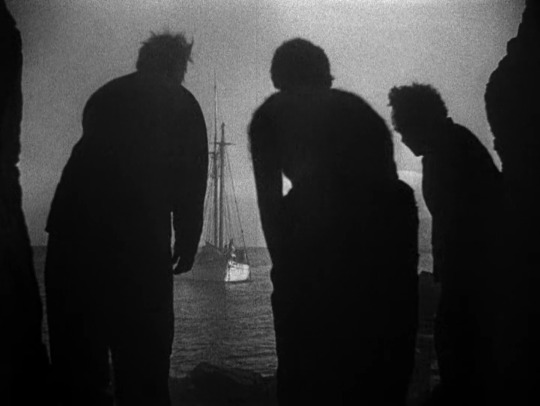
Director: Erle C. Kenton
Cinematographer: Karl Struss
Writers: Waldemar Young, Philip Wylie
Cast: Charles Laughton, Richard Arlen, Arthur Hohl, Kathleen Burke, Leila Hyams, Stanley Fields
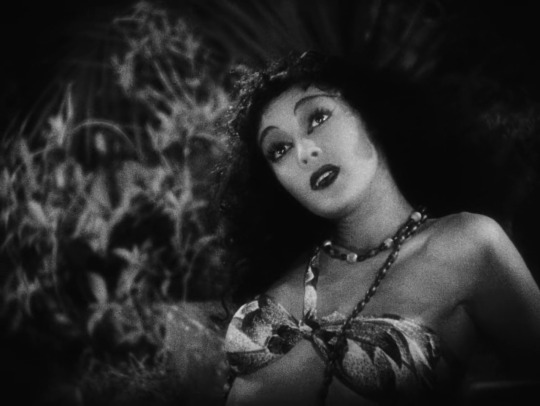
Plot: A shipwrecked sailor finds himself on an island where a mad doctor is blurring the lines between man and beast.
Review: Provocative and strange, Island of Lost Souls raises ethical questions, before providing its own deeply unsettling answers.
Overall Rating: 4/5

Story: 4/5 - An intriguing exploration of science without morals and what it means to be human. Hampered some by the reductive portrayal of the islands' occupants and potentially racist undertones.
Performances: 4/5 - Laughton is a delightful mix of campy and sinister, and balanced well by Hohl's somberness. The rest of the cast is sympathetic, with Fields' arc being my favorite.
Cinematography: 4.5/5 - Gorgeous use of shadows.
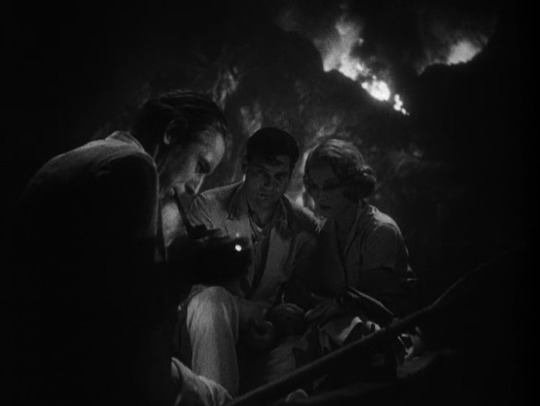
Editing: 4/5
Effects: 4/5 - Well employed fog and fire.
Sets: 5/5 - A mix of real locations and sets, with the wild jungle encroaching upon Moreau's tidy compound reflecting his own melding of nature and science.
Costumes & Make-Up: 5/5 - The creature makeup for this film was very innovative. The one-hoofed man was especially great.
Film Fact: This movie was banned in many countries and was one of the most difficult restorations for the Criterion Collection, as it had been heavily edited for censorship reasons.
youtube
Trigger Warnings:
Misogyny (uncritical; of the era)
Moderate violence (largely off-screen)
Disturbing themes of animal/human experimentation
Body horror
Unethical medical scene (not graphic)
Torture and medical abuse (largely off screen)
It is implied that a character wants a woman to be raped
#Island of Lost Souls (1932)#Island of Lost Souls#Erle C. Kenton#American#sci fi horror#science fiction#creature feature#Dread by the Decade#review#1930s
13 notes
·
View notes
Text
American Fiction Movie Review
Coming out just in time for Christmas weekend is first-time feature director Cord Jefferson’s American Fiction – it’s this sly, brainy dramedy that’s all about a joke that totally blows up in the face of Thelonious Ellison, aka Monk (played by the amazing Jeffrey Wright). Monk’s this super serious, straight-laced, blank-faced lit professor who writes elaborate, fictional tomes about Ancient Greek that basically no one reads. He secretly wishes to have a popular bestselling book.

Monk’s Black, and because of that, his books end up in the “African American fiction” section instead of where he feels they really belong. Editors are on his case to make his Aeschylus sound more street, but Monk’s having none of that. He’s all about staying true to his academic roots. Then, he stumbles into a reading by the successful, but in his opinion, sellout author Sintara Golden (Issa Rae), and you can feel his internal scream.
In a fit of rebellion, Monk writes this over-the-top novel, “My Pafology,” loaded with every Black stereotype he can think of, thinking he’s giving the finger to the literary world. But surprise, surprise – they love it and throw a ton of cash at him. The movie’s screenplay, based on Percival Everett’s novel Erasure, is sharp and witty.
Jefferson makes sure to show us the sides of Monk’s life that have nothing to do with race. Can he convince his mom (played by Leslie Uggams) to get proper care? Can he connect with his gay brother (Sterling K. Brown), his no-nonsense sister (Tracee Ellis Ross), and the gorgeous, newly-single neighbor (Erika Alexander)? There several other fun characters, including John Ortiz as the money-hungrey literary agent, and Adam Brody as a slick Hollywood producer hoping to turn Monk’s controversial book into an award-winning film.
Trust me, you’re in for a wild ride with American Fiction – it’s clever, thought-provoking, and just a whole lot of fun. It’s in my Top 10 of the year.
= = =
S.L. Wilson
10 notes
·
View notes